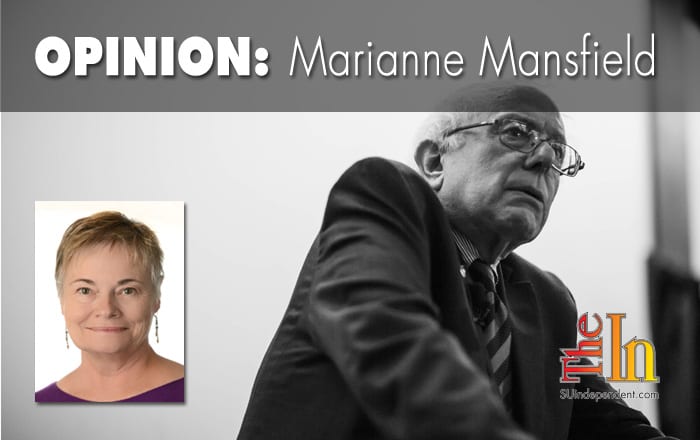 |
| Photo: StumpSource.org Photo Stream |
Written by Marianne Mansfield
What makes Vermont Independent Bernie Sanders hard to ignore is that when you listen to him, the guy makes all kinds of sense. Close your eyes to the word ‘Socialist’ that is printed in virtually every sentence about his campaign for the Presidency in 2016. Close your eyes to the unruly swirl of white hair and the glasses that occasionally creep south of their appointed resting spot, and listen.
This is a guy who says he’s in it to win. Okay, so every candidate says that, but when Bernie (and that’s what he wants to be called) says it, you hear a sense of gritty, New England resolve. It’s as though he truly believes that once you hear him out, you and your vote will fall into his camp.
So, this is Bernie on Super Pacs and campaign financing. In his first interview as a candidate, he told CNN anchor Wolf Blitzer that he didn’t want billionaires to bankroll his campaign. He railed against the influence of big campaign donors like the Koch boys and Tom Steyer. And just so you know that Bernie is bi-partisan in his opposition to the idea of money buying elections, you should know that Steyer is a philanthropist, environmentalist, and hedge fund manager backing Hillary Clinton. Of course, since Bernie is challenging Hillary, I suppose it makes sense for him to poke at both mainstream parties and their fundraising juggernauts.
Bernie has advocated for Congress to overturn the 2010 U.S. Supreme Court’s decision in Citizens United, which he calls one of the worst decisions in the Court’s history. His opposition to big—and I mean HUGE—money in politics is one many of us share. And it makes sense. He says he wants a government that works for all the people, not just the wealthiest 1 percent. That sounds good to me.
Then there is Bernie Sanders on climate change. He told an interviewer from the Washington Post that he has developed a climate policy based on his belief that now is the moment to act to avoid catastrophic climate change danger in the decades ahead. Specifically, he advocates “a tax on carbon; a massive investment in solar, wind, geothermal; it would be making sure that every home and building in this country is properly winterized; it would be putting substantial money into rail, both passenger and cargo, so we can move towards breaking our dependency on automobiles.”
While it may be short on specifics at the moment, his plan envisions a future that addresses the needs of the citizens of our country. Not just the billionaires, but the rest of us.
On our country’s crusade against ISIS, which Bernie has repeatedly referred to as ‘a war (that) is a battle for the soul of Islam,” he calls for Muslim countries to join together to wipe out ISIS using their considerable financial and geopolitical resources. He has challenged the countries of Saudi Arabia, Qatar, Jordan and the UAE to take the lead. He envisions America’s role as one of support but with many fewer of our young men and women in harm’s way. Again, it makes sense to me.
On Wednesday of this week, Bernie proposed a U.S. Senate bill to break up the biggest banks in the country. He said, “If an institution is too big to fail, it is too big to exist.” Imagine if his bill had been law nine years ago. Would we have experienced the biggest financial recession since the Great Depression? I think not.
Then on Thursday, Bernie urged President Obama to cancel a trip to the Nike corporate headquarters in Beaverton, Oregon. The President’s trip is designed to shine a favorable light on an upcoming major trade agreement. Bernie says that the trip sends the wrong message, since Nike has moved many of its manufacturing jobs to cheaper labor markets outside this country. Bernie champions the American worker who suffers when formerly American jobs are shifted abroad.
So far, how much of this sounds like your mom and dad’s socialism? To me, not so much. At the root of my understanding of socialism from my college Econ101 days is the foundation of—and belief in—common ownership of goods and materials that can be used for production. So while Bernie may prefer to paint himself a Socialist, from what I know of him so far, I’m okay with that.
When I open my eyes to Bernie Sanders, I see a politician who champions the average American citizen and does so in ways that are grounded in common sense, if a little—or even a lot—left of the traditional way of thinking about our country’s issues. Isn’t that what we need, though, rather than more of the same?
Is he eccentric? Of course he is. Does he have a snowball’s chance in Hell of getting elected? Probably not. But Bernie Sanders is a like a breeze blowing through the fog of politics as usual.




